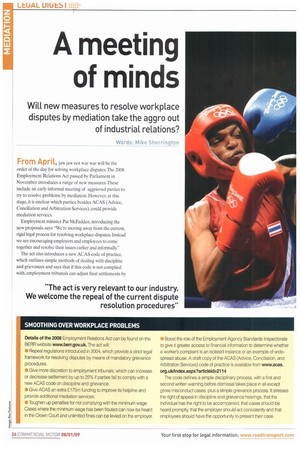A meeting of minds
Page 26

Page 27

If you've noticed an error in this article please click here to report it so we can fix it.
Will new measures to resolve workplace disputes by mediation take the aggro out of industrial relations?
Words: Mike Sherrington From April, jaw jaw not war war will he the order of the day for solving workplace disputes. The 2008 Employment Relations Act passed by Parliament in November introduces a range of new measures. These include an early informal meeting of aggrieved parties to try to resolve problems by mediation. However, at this stage, it is unclear which parties, besides ACAS (Advice, Conciliation and Arbitration Services), could provide mediation services.
Employment minister Pat McFadden, introducing the new proposals, says: "We're moving away from the current, rigid legal process for resolving workplace disputes. Instead we are encouraging employers and employees to come together and resolve their issues earlier and informally."
The act also introduces a new ACAS code of practice. which outlines simple methods of dealing with discipline and grievances and says that if this code is not complied with, employment tribunals can adjust final settlements by up to 25%. Other measures in the act are an increase in penalties for flouting the minimum wage and strider controls on employment agencies.
The proposals have been welcomed by the industry, trade unions and transport lawyers The general feeling is that anything would be better than the preceding 2004 legislation, which meant that relatively simple workplace problems became tied up in legal red tape and became costly and time consuming to resolve.
Good news Ruth Pott, Road Haulage Association director of employment affairs, says: "The act is very relevant to our industry. We welcome the repeal of the current dispute resolution procedures; our concern with the existing regime has been the increase in the number of employers that have found themselves in tribunals with automatic unfair dismissal claims, simply because of minor procedural failings."
Victoria Soloman, a partner in Gloucester legal firm Treasures, says: "Under the 2004 act, firms often settled out of court, even though they had a very strong case, because of the expense of taking a case to tribunal. Anything that simplifies matters has to be good.! am currently dealing with a case in the transport industry, where an employee admitted gross misconduct for theft, but matters still haven't been resolved, months later, because she has taken out three separate grievances" Trades Union Congress policy officer Hannah Reed also welcomes the changes. She says: "The new dispute resolution rules, including the ACAS code, recognise that using discipline and grievance procedures is the best way to resolve disputes. Where employers sit down with their employees and union representatives, problems are more likely to be resolved amicably and employees are more likely to hold on to their jobs, which avoids the need to recruit and train new staff. If these talks fail, employees still have the right to go to an employment tribunal."
Mediation as a way of solving workplace disputes is not commonly used in this country, but where it has been used it has been very successful. A spokeswoman for ACAS says: -Bodies that provide mediation services report that between 85% and 95% of disputes are resolved by mediation without further action."
When should it be used?
Despite its success rate, there are still concerns about how often mediation will be used:There is no legal stipulation to go down the mediation route, a move welcomed by the Confederation of British Industry, which finds enforced mediation too restrictive.
Roger Byard, an employment law partner at solicitor Cripps Harries Hall, who generally welcomes the proposals, says: "I can't see how mediation will help much in disciplinary matters. If an employee is alleged to be guilty of misconduct, it is much more important that a fair hearing takes place where both sides can put their case.
But the Department for Business, Enterprise & Regulatory Reform still sees mediation as being a way of saving industry both time and money and will mount a campaign to encourage informal dispute resolution before the law comes into effect in April. ACAS is to encourage firms to include mediation to resolve any grievance procedure.
Pott views the non-payment of the national minimum wage as not really being an issue for the road haulage industry, saying most employers already pay well in excess of the minimum. Rob Don, the CBI's senior policy adviser, welcomes tougher legislation. He says: "Stricter penalties on firms that flout the minimum wage will be a good thing. It will benefit the majority of good employers who make the minimum payment. It stops them being undercut by cowboys who don't pay their staff proper wages" The 2008 act is generally viewed as the chance of a fresh start in resolving workplace problems. Whether it will achieve this is open to question but its success really depends on both sides of the industrial relations equation being able to demonstrate flexibility and to move away from the old entrenched attitudes. •








































































































































